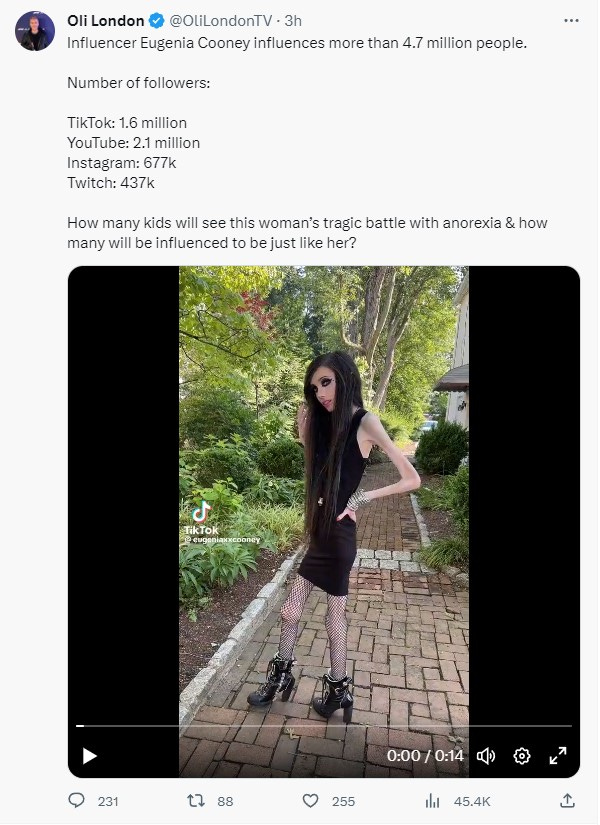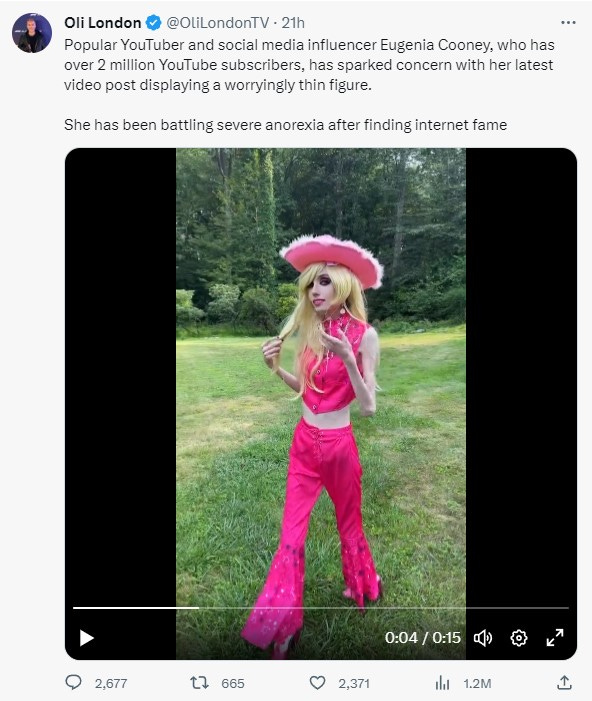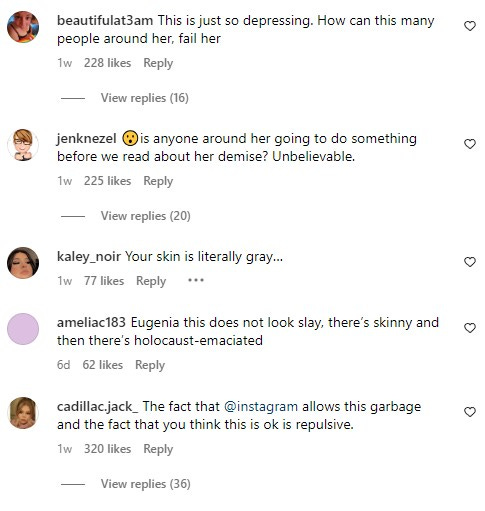Is it Time For “Anorexia Affirming Care” in America?
Why help people with one mental disorder and leave the other deliberately untreated?
Anorexia and its cousin, Bulimia afflict a very small, but still significant percentage of the American population:
0.3% of American men have anorexia nervosa.
0.5% of American men have bulimia nervosa.
0.9% of American women have anorexia nervosa.
1.5% of American women have bulimia nervosa.
Personally, I’ve known at least three women who have struggled with anorexia, and given how thin some of the other women I’ve known were, it wouldn’t shock me if there were several more I’ve known that secretly have the same problem. So, what is Anorexia?
To be diagnosed with anorexia nervosa according to the DSM-5, the following criteria must be met:
* Restriction of energy intake relative to requirements leading to a significantly low body weight in the context of age, sex, developmental trajectory, and physical health.
* Intense fear of gaining weight or becoming fat, even though underweight.
* Disturbance in the way in which one's body weight or shape is experienced, undue influence of body weight or shape on self-evaluation, or denial of the seriousness of the current low body weight.
Intriguingly, there are two contrary things we can simultaneously say about that criterion.
The first is that human beings are a little like a car. You may be able to drive a car quite a long way without doing proper maintenance on it, but eventually, the price of that is going to be a lot of damage or the car may stop running entirely. The same goes for Anorexia. If you deliberately starve yourself for a long time, you may permanently damage your body or even die as a result.
That being said, the second thing is that some of these standards are more arbitrary than they may seem. A lot of people are extremely concerned about becoming fat, which is understandable and what is considered to be “underweight” can be more than a little subjective.
For example, it’s very common for “supermodels” to straddle this line of being underweight. Are they anorexic? Are they not? That line may sometimes not be very clear. As a related example, I have a very fit friend of mine who seems to have a naturally thin frame and is big into running. I’ve never thought of her as “anorexic” and to the best of my knowledge, she isn’t. However, when I was writing this article, it reminded me of a picture that she had once put up that showed the striations of the muscles in her back. At the time, I was like, “She’s in amazing shape. That’s hot,” but in retrospect, do you know how little body fat a woman needs to have for you to be able to see that kind of definition in her back? Especially when she’s not a particularly muscular woman? VERY, VERY LITTLE.
Of course, I’d still say there’s a huge difference between that and this:
I had never heard of Eugenia Cooney, but she essentially seems to be the Dylan Mulvaney of the Anorexia community. Here’s an excerpt about her from an article called, Slowly Dying on YouTube: Eugenia Cooney & Nicokado Avocado Are Two Sides of the Same Coin:
Cooney was 17 years old when she first started her channel.
For many years, she refused to confirm that she had an eating disorder or would deflect from the topic by suggesting that she was just naturally that size or had a medical condition.
...In January 2019, she posted a Kingdom Hearts makeup tutorial which caused a stir on the Internet, with people horrified that she looked thinner than ever and was even developing reddish tinting in her legs.
This can be a sign of cardiovascular problems that cause insufficient blood flow. Fellow content creators began a rallying call to help Cooney, making videos of their own drawing attention to the fact that she looked like she was a day away from death.
Soon after this video, Cooney suddenly disappeared off the Internet, and there were rumors that she had been admitted to a treatment facility for her eating disorder. It was later revealed that her friends arranged for mental health professionals to evaluate her and placed her on an involuntary psychiatric hold.
She was admitted to an eating disorder rehab for a month and took a five-month break from the Internet. Photos had leaked showing her in higher spirits, and many commented that she looked healthier – something that can be triggering for sufferers of severe anorexia.
...Cooney’s YouTube comeback came in the form of a documentary on popular content creator Shane Dawson’s channel, where he interviewed her about seeking treatment for her eating disorder. This was the first time she had ever admitted to suffering from an eating disorder, and people noticed that she seemed much more genuine than in her other videos.
Unfortunately, the documentary came far too soon in Cooney’s recovery, and even though she made a few videos where she seemed to be doing better, she quickly relapsed and is back to her old ways. Cooney is about as emaciated as she was in the video that caused such a scare back in 2019, leading to her hospitalization.
...Cooney seems out of touch with reality and entirely consumed by her disorder. All of her videos are about showing off her body. Sometimes she posts clickbait with some reference to food, but she never eats it or gets any food, even in a video where she goes to the grocery store.
Cooney has broken off ties to her former friends who caused her involuntary psychiatric hold, claiming they traumatized her. She lives at home with her mother, who many blame for allowing her daughter to waste away on the Internet for so many years. Of course, we don’t have details on what goes on behind closed doors.
What’s most interesting about this is that people, at least openly, seem to be overwhelmingly to be on the same page about Eugenia Cooney. Other content creators were publicly noting she’s too thin. People are worried she’s going to die. Her fans are concerned about her. Everyone seems to think it’s a good idea that she got treatment and is encouraging her to get treatment again, right? If you go to her Instagram page, these are pretty typical of the sort of comments her own fans are making about her:
This begs an incredibly obvious question, which is, “Why isn’t she getting anorexia-affirming care?”
Shouldn’t people be encouraging her to lose weight? Maybe suggesting she get some liposuction? Shouldn’t they be talking about how this is a civil rights issue and accusing anyone pointing out that this is a mental disorder that may kill her of being “Anorexiaphobic?” Shouldn’t there be pro-anorexia posters in schools? Where are the anorexic women reading books to school children? That is how our society treats similarly mentally ill people that claim they’re trans, isn’t it?
So why do we encourage one mental disorder and discourage the other?
Some people might say, “Oh, but they’re totally different.” Are they really? Because they both appear to be mental disorders that cause a person to have a distorted image of their body and both disorders often lead to horrible physical consequences and even death.
You might counter that by saying, “But, trans people don’t think they’re mentally ill. They don’t want to change!” But, pretty obviously, that’s true for most anorexics, too, isn’t it? If Eugenia Cooney really understood how she looked and that she had a serious mental problem, she’d be eating a sandwich right now and going somewhere to get some help tomorrow, correct? Eugenia Cooney, Dylan Mulvaney, Caitlyn Jenner, and Jazz Jennings are all mentally ill, but our society encourages one of them to get better and three of them to stay sick. There’s something horribly wrong with that.
You don’t “affirm” mental disorders and encourage people to lean into them. You at least try to help them get better. To do otherwise is extraordinarily foolish and cruel. The way our country is encouraging trans people to embrace their mental illness is one of the worst things we’ve ever done in our country. It may not top slavery and abortion, but it belongs in the same conversation and that needs to change.





as someone who had anorexia my first year of college and recovered on my own, i'm sure glad i wasn't surrounded by a chorus of cheerleaders, affirming me on my "weight loss journey." i whittled myself down to 79 lbs (5'2") by eating an apple every other day (so i guess i kept the doctor somewhat away) and still thought i was fat. my acute episode lasted a year but the effects lingered on for 5. i was amenorrhic for 5 years and hid my weight gain with sweaters and chains of safety pins to bridge the gap in my waistbands. i was a sneak eater, refusing certain foods in public but gorging them on the sly and doing a bit of puking to keep the calories at bay.
when i started to exercise seriously- mainly interval training- i got to like my body and learned that i could eat a whole range of foods.
after reading The Omnivore's Dilemma, i found myself a farmer and switched to a whole foods, organic Weston Price type diet with massive improvements in my general health. my menstrual cycles ran like clockwork and menopause, when it came, was a complete non-event with no uncomfortable symptoms whatsoever.
today i am a very fit young looking 70 year old with a backyard of home grown vegetables and a freezer full of regeneratively raised meat. i have a strong as an ox 75 year old boyfriend who scampers up his 40 ft ladder to repair our historic metal roof.
i'm very particular about where our food comes from (farmers i know) and i prefer to cook it at home myself. Bill Gates would say that my prohibition of all processed packaged chemical synthetic GMO, etc foods is in itself a kind of eating disorder but he has a gut and boobs and i don't (well, i have breasts but hey, i am a woman).
we choose to spend our food dollars at the farmer's market and keep it all out of Cargill/Monsanto's pockets.
likewise i go only to alternative doctors who don't take insurance; i'm a medicare bargain. i have a personal gym on the 3rd fl and i'm up there everyday lifting weights and riding an HIIT bike. we have a far infared sauna for detoxing.
i was lucky. my friend's sister died in a Karen Carpenter like manner from her eating disorder. another friend's teeth were all rotted out from chronic bulimia. i didn't have teachers or internet support groups egging me on to lose even more weight. no one suggested the amputation of body parts as a way to trick the scale.
i didn't live in a time when a person could actually make a living posting tik tok videos of their derangement or when the culture celebrated these terrible problems as "body positivity." i think i dodged a bullet. i was left alone to outgrow an insecure phase and blossom into a strong accomplished woman
Once upon a time, the traveling carnival was where freaks were showcased. Now, they are massively promoted and lauded and followed on social media, in blue state streets, in schools all across the land, in most entertainment, and government and yes, even churches. We have advanced beyond Clown World. Humans now live in Nightmare World. Ugly. Sickening. Repulsive. Frightening. Dangerous.